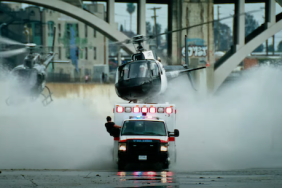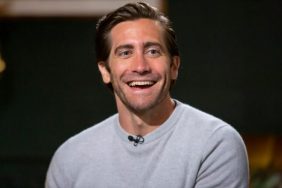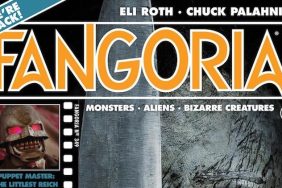It’s surprising to learn that Nightcrawler is Dan Gilroy’s directorial debut. Gilroy’s first script — Freejack, the bonkers put-the-billionaire’s-brain-in-a- new-body action-comedy starring the bonkers cast of Emilio Estevez, Mick Jagger, Rene Russo and Anthony Hopkins — was released 22 years ago. Gilroy has gone on to write screenplays and screen stories for The Bourne Legacy (for his brother, Tony Gilroy), Real Steel and Tarsem Singh’s The Fall.
Nightcrawler is very accomplished for a directing debut. It makes sense that Gilroy had been working on scripts for nearly two decades, because there’s a certain type of depraved sense of humor that’d be very difficult to pull off without working in the film business for a while. What’s the funny? Lou Bloom (Jake Gyllenhaal) filming — and later staging — accidents and crimes as a business model for success. He sells the tapes to a local news producer (Rene Russo). Gyllenhaal’s performance is much lighter than you’d expect. No seriously, he lost 30 pounds for the role. He slendered down to be as thin as a sideways shadow, someone who is up all night and always caffeinated and ready to film. And he’s hilarious. But eventually you feel bad for laughing. Again, it’s a tricky thing to pull off.
We spoke with Gilroy about how the current job economy informed his story and Jake’s character. After the premiere at the Toronto International Film Festival, Gilroy was surprisingly well-rested (he got five hours of sleep, he informed CraveOnline) and was all pep.
Dan Gilroy: How are you?
CraveOnline: I feel like I’m nightcrawling right now.
Yeah, this is like your grind right now as a journalist, right?
Yeah, this is my first TIFF grind. I think I got about two hours of sleep last night. Got up super early to write some reviews.
Ah, I got five and it’s made a big difference.
Actually maybe because everything right now feels like a continuous conversation since I’m moving from room to room, but I’d like to actually like to start our interview where I left off with Rene…
Let’s do it.
We were talking about Jake Gyllenhaal’s age in the movie and his obsession with starting a career in his early-mid 30s, even offering to intern places. And those who don’t have a career by that point, with our current economy, it’s like quicksand because you look like you either didn’t have ambition before, or that you might have standards and not be taken advantage of.
I think there is an enormous sea change happening in the global workforce. It has a lot to do with globalization. I think that people used to have a hope for a career or meaningful employment, and its been reduced to internships, part-time work or just grossly underpaid work. I think its affecting 10s of millions of people around the world, particularly those in their 20s and 30s. And I just feel it all the time.
I remember that time in my life when you just really want to make a mark, both for yourself and the people around you. Oddly enough that big thrust generally takes a little while – for all this preparation we’re supposed to do when we’re younger it really doesn’t kick in for a lot of people for a while – and I wanted to write a film where you start with someone who is late at trying to start a career. And one of the opening scenes he’s giving an elevator pitch to the salvage manager, just saying, “hire me, I really want to work.” He’s so earnest and sincere and he’d be happy if he’d get the job at the salvage yard. Thankfully he didn’t because then the movie would’ve been over, or I’d’ve had to write something different. But it’s just one example, because any employment right now is meaningful and valuable to people right now. Not having it leads people to make desperate decisions.
There’s a part of his character – it’s only one line in the movie, but once it’s said you can hear it a lot in his speech – is that he learns a lot from watching videos on the internet. In a way, whenever he’s making valid points he’s speaking like an aggregate news source. He’s just pulling information from a bunch of areas and bundling them together in some presentation like its his own, but it was just very basic surface research without context… I guess I didn’t get into a question there…
No, but you’re right and that was a definite intent. The only backstory that we came up with and didn’t show was that he was abandoned, he has no family, and there might have been some type of abuse. So the internet became the place where he gets a connection with the world. At the gravitational center of it all is the idea that he’s latched onto capitalism and the ladder of success. And these ideas are going to give him direction and keep him moving. So at the center of that, and what pulls him in – as you pointed out – are these motivational speeches. I call them Fortune 500 bullshit jargon-speak. And he spews it out like an über capitalist. He believes in the bottom line and not the human spirit.
Related: TIFF 2014 Interview – Rene Russo on ‘Nightcrawler’
When I was watching the film, he felt like a modern Rupert Pupkin (Robert De Niro in The King of Comedy).
Oh sure. The interesting connection there is that there aren’t a lot of films that do what Scorsese did, and what we tried to do, which is to take your lead character and make him your villain and your hero. Rupert Pupkin is a very funny and charming guy on the surface. Of course in the film he kidnaps an entertainment personality and threatens to murder him. But you never lose that initial connection with the character. There are a few other films that do this To Die For with Nicole Kidman, for example.
The positive attitude psychopath.
Yes, exactly. The likable villain.
How would you compare this to other obsessive recording films like Blow Out, Camera Buff, Blowup, Peeping Tom?
You know, I was never aware of a topical conversation about recording images. Obviously it is going on a lot more now because people have the devices to do it. I think there’s a connection with Nightcrawler and Blowup and other films where visual imagery is integral to the story. It allows you to play with images. Where that really came through was the shootout in the diner. We were able to record the action but also have the action inside his viewfinder while he’s watching on the video cameras.
It’s like an extra barrier from reality.
Yeah it provided a frame within a frame.
When you and Robert Elswit were shooting that scene, was what we see in the viewfinder the actual live shot of what you were filming? Or was it a separate shot that you had to insert?
That’s a good question. Half the time it was the real shot. But the other half, for whatever reason, the frame didn’t hold up the same so we did have to go back in and do CGI frame-within-frame.
What is the importance of setting the story in Los Angeles? How does it add to the story?
Well, it was crucial to this story because “nightcrawling” is the most prevalent in Los Angeles. It’s a huge TV market and an enormous area to cover.
In doing research on this film, how many companies do this is their primary business in Los Angeles?
It seems to fluctuate between a half dozen and a dozen on any given night.
And it is like TMZ with blood?
Oh yeah, absolutely.









